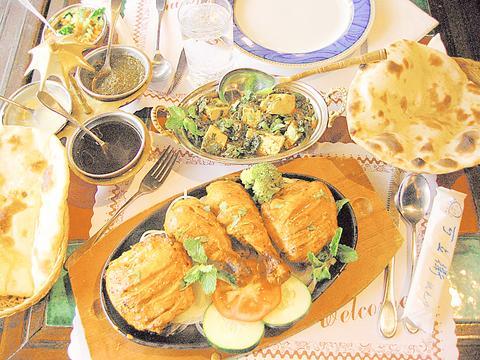For the past decade, Karachi native, Muhammad Ali, has been cooking up a storm with his authentic, flavorsome and at times tongue numbing Pakistani and Indian fare.
Originally located amid the chaos of the bustling Ninghsia Rd., (寧夏路) and its ever-busy night market, but for the last three years Ali has been operating out of the second floor of a commercial building on Nanjing East Road (南京東路).

PHOTO: GAVIN PHIPPS, TAIPEI TIMES
Vegetarian and non-vegetarian dishes such as sizzling spice-infused tandoori chicken (NT$280 to NT$550), nut-loaded and creamy masalas (NT$200 to NT$280), yogurt-based makhanwallas (NT220 to NT$340) and fiery hot vindaloos (NT$290) provide a range of flavors that will be popular with new-comers and hardened curry fanciers.
And of course, what curry restaurant would be complete without the fine breads to accompany the meal. Here too Ali Baba's doesn't disappoint with the choice of reasonably priced breads including butter naan, garlic naan, allo paratha (bread stuffed with potatoes), keema naan (bread stuffed with minced lamb) and plain naan, just to name a few.
If you still have room after the main course, then check out the desserts, which are as authentic as all the other fare. Gulab juman (NT$80), the popular small cake balls made from milk and flour deep-fried and served in a light sugar syrup, and gajar halwa (NT$100), a carrot based dessert made with milk and sugar and best served with ice cream are a great way to complete any meal.
In the coming weeks Ali is set to introduce his new menu. Along with the addition of glossy photos of all the dishes on offer, the ever-jovial restaurateur has added nearly a dozen new creations to the already extensive inventory.
While Ali will be the first to admit that several of the seafood based new additions are far from authentic, he has taken steps to include half-a-dozen or so dishes from his homeland, Pakistan, that are rare finds in Taipei.
These include authentic Karachi dishes such as haleem, mutton cooked with several varieties of beans and rice, and paya, a slightly bony dish made of slowly cooked lambs' feet and spices -- a dish Ali describes as "a meal for men."
For those looking to sample a mixture of South Asian flavors at one sitting, Ali Baba's offers a reasonably priced weekend buffet. Priced at NT$399, the buffet changes every weekend, but always includes a good choice of both vegetarian and non-vegetarian curries, kormas, masalas, do piazas, daals and so on.
Although, for obvious reasons, alcoholic beverages are not served at Ali Baba's, diners wishing to enjoy a drink or two with their meal are free to bring their own without fear of either offending the staff or paying an annoying corkage charge.

Three big changes have transformed the landscape of Taiwan’s local patronage factions: Increasing Democratic Progressive Party (DPP) involvement, rising new factions and the Chinese Nationalist Party’s (KMT) significantly weakened control. GREEN FACTIONS It is said that “south of the Zhuoshui River (濁水溪), there is no blue-green divide,” meaning that from Yunlin County south there is no difference between KMT and DPP politicians. This is not always true, but there is more than a grain of truth to it. Traditionally, DPP factions are viewed as national entities, with their primary function to secure plum positions in the party and government. This is not unusual

More than 75 years after the publication of Nineteen Eighty-Four, the Orwellian phrase “Big Brother is watching you” has become so familiar to most of the Taiwanese public that even those who haven’t read the novel recognize it. That phrase has now been given a new look by amateur translator Tsiu Ing-sing (周盈成), who recently completed the first full Taiwanese translation of George Orwell’s dystopian classic. Tsiu — who completed the nearly 160,000-word project in his spare time over four years — said his goal was to “prove it possible” that foreign literature could be rendered in Taiwanese. The translation is part of

Mongolian influencer Anudari Daarya looks effortlessly glamorous and carefree in her social media posts — but the classically trained pianist’s road to acceptance as a transgender artist has been anything but easy. She is one of a growing number of Mongolian LGBTQ youth challenging stereotypes and fighting for acceptance through media representation in the socially conservative country. LGBTQ Mongolians often hide their identities from their employers and colleagues for fear of discrimination, with a survey by the non-profit LGBT Centre Mongolia showing that only 20 percent of people felt comfortable coming out at work. Daarya, 25, said she has faced discrimination since she

The other day, a friend decided to playfully name our individual roles within the group: planner, emotional support, and so on. I was the fault-finder — or, as she put it, “the grumpy teenager” — who points out problems, but doesn’t suggest alternatives. She was only kidding around, but she struck at an insecurity I have: that I’m unacceptably, intolerably negative. My first instinct is to stress-test ideas for potential flaws. This critical tendency serves me well professionally, and feels true to who I am. If I don’t enjoy a film, for example, I don’t swallow my opinion. But I sometimes worry